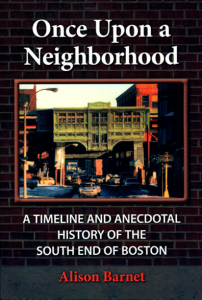by Angela Lee
“Neighborhood Matters” is an outreach and advocacy project hosted by Northeastern University Libraries’ Archives and Special Collections (ASC). This lunch time series aims at promoting diversity and inclusion by organizing a free public event; its goal includes bridging campus and community. “Neighborhood Matters” first began in 2014 and is held at Snell Library on the Northeastern University (NEU) campus two to three times a semester. The project was proposed and led by the head of NEU’s Archives and Special Collections, Giordana Mecagni. “Neighborhood Matters” started out as the simple format of a Boston-specific documentary screening event; it has grown into a more interaction-driven forum that encourages thought-provoking communication over the past six years.
The scope of this community-based initiative is confined to the city of Boston. Within this geographical boundary, “Neighborhood Matters” sheds light on local history that is largely underrepresented through unique stories narrated by our neighbors. The project is an embodiment of NEU’s ASC, aligned with their collection policy to curate diverse historical records to preserve the history of Boston’s social movements. The individual voices captured by “Neighborhood Matters” bring insight and new perspectives to seemingly mundane places in Boston.
The project’s target audience includes local communities, as well as NEU members, but events are open to anyone who is interested in how actual neighbors have shaped and been shaped by Boston’s distinct neighborhoods. Not only does “Neighborhood Matters” encourage community members to appreciate their neighborhood more, but it also offers an opportunity to network. As a result, NEU’s ASC becomes a nexus of rekindled community spirit and identity.
According to NEU’s archivist, Molly Brown, the topic of each event is curated in response to current and socially significant issues that are worthy of public attention. Due to this adaptability, an event is planned a few months ahead of time, rather than on a yearly basis. Sometimes socially active figures reach out to NEU’s ASC and propose an idea for an event. For instance, Alison Barnet, who is a local author and a long time committed attendee of the “Neighborhood Matters,” suggested the recent event entitled “Once Upon a Neighborhood: A History of the South End from Alison Barnet.”
This author talk was held on February 11, 2020, and featured Alison Barnet as a special guest. Originally from New York, but now a resident of the South End since the 1960s when she was a transfer student at Boston University, Barnet has witnessed the ceaselessly changing landscape of Boston over the past half century.
 This South End history writer shared her version of the Bostonian chronicle, which traces Boston’s legacy all the way back to the 1600s, based on her newest book Once Upon a Neighborhood: A Timeline and Anecdotal History of the South End of Boston. The event had a great turn out and a large number of elderly attendees, due to Barnet’s many personal allies who showed up to support her. While she recounted snippets of South End history, the audience reacted with fervent nodding or occasional sighs as a sign of empathy.
This South End history writer shared her version of the Bostonian chronicle, which traces Boston’s legacy all the way back to the 1600s, based on her newest book Once Upon a Neighborhood: A Timeline and Anecdotal History of the South End of Boston. The event had a great turn out and a large number of elderly attendees, due to Barnet’s many personal allies who showed up to support her. While she recounted snippets of South End history, the audience reacted with fervent nodding or occasional sighs as a sign of empathy.
Following Barnet’s jovial reminiscing through her long-term residency in the South End, she presented video footage of her 1980s appearance on network TV. Barnet’s satirical performance in the skit addressed a looming threat of gentrification and displacement in Boston. Since the gentrified neighborhoods are still an ongoing battle faced by the city of Boston, her story is not limited to the past but resonates with all of us in the here and now. As the series’ self-explicit title suggests, neighborhood does matter. However, “Neighborhood Matters” asks us to consider why it matters, how a sense of neighborhood can be cultivated, and why it is important to stay connected with the people who live around us. The belief behind this outreach and advocacy project is that posing these questions makes a difference in our everyday life, while also demonstrating the tangible value of NEU’s ASC.
This grassroots empowerment is what has driven the “Neighborhood Matters” forward, resulting in enhanced social recognition of NEU’s ASC. Brown, NEU’s archivist, attributed the continuous positive feedback and growing number of loyal attendees as an indicator of the efficacy of “Neighborhood Matters” since its initiation. This gradual but steady effort contributes to increased community awareness, and its impact reverberates beyond NEU’s neighborhood.
Elizabeth Nagarajah, an attendee who is a Class of 1990 NEU alumna, described “Neighborhood Matters” as an invitation to all to reflect upon their society’s interconnectedness. As a Roxbury resident for nearly 40 years, Nagarajah is frustrated by the frequent marginalization of the Roxbury, Dorchester, Mattapan, and Hyde Park neighborhoods in the media. In her eyes, Roxbury is “a neighborhood full of families and people who care and love the area,” even though the neighborhood is “depicted as a crime infested area full of brokenness.” Nagarajah stressed the importance of people seeing more of these marginalized neighborhoods than what the local news displays, with the help of projects like “Neighborhood Matters.”
At the heart of NEU’s ASC’s achievement lies their proactive redefinition of their role as a social activist, as opposed to a simple institutional library and archives. NEU’s ASC has embraced their socio-geographical context as a means of garnering public support and earning advocacy. The more people realize the influence of their neighborhood through “Neighborhood Matters,” the more people commit to building a more inclusive community, supported by NEU’s ASC.
